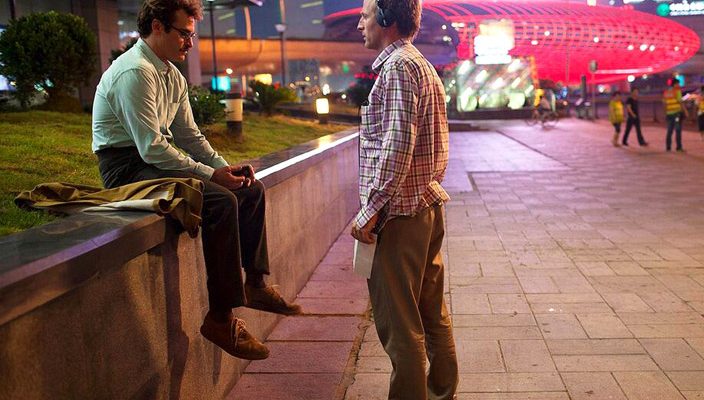
While you’ve probably heard it described in simple ways, Spike Jonze’s “Her” is much, much more than the iPhone movie about falling love with Siri. And it’s hardly a film about technology and our future—though that obviously is an element. In many ways, “Her” is a traditional love story and relationship movie, but finds an ambitious concept to explore notions of connection, isolation, loneliness and loss.
Set in a not-too-distant future, “Her” takes place in a pleasant, soft-pasteled world where technology has made our personal operating systems artificially intelligent. Joaquin Phoenix stars as a man dealing with the fallout of his impending divorce and life changes for him when his OS upgrade (voiced by Scarlett Johansson), turns out to be one of the most sensitive, dynamic and emotionally intuitive people, errr—A.I. devices—he’s ever met. Can you form a relationship with someone who technically doesn’t exist, at least not physically? And what happens when these two “people” fall in love? Jonze’s “Her” challenges our notions of love, but also expresses so much about the struggles of relationships, no matter what form they take. As he essentially suggests in our interview: anything that’s difficult is usually worthwhile.
Co-starring Amy Adams, Rooney Mara, Olivia Wilde, Chris Pratt and a bunch of fun voice cameos that you should listen for closely, we described the film in our review as “disarmingly funny, insightful and empathetic.” Nominated for three Golden Globes so far, it’s also a potential Oscar contender as well. We recently sat down with Jonze to discuss the challenges of creating “Her,” working with his voice actor Scarlett Johannson, the Arcade Fire, who wrote part of the score, his old screenwriting pal Charlie Kaufman and more. “Her” opens in limited release this weekend opens wide on January 10, 2014. Our conversation started sort of mid-sentence as Jonze was talking about the site’s taste.
“There were times in ‘Adaptation’ during the editing where I really thought, ‘Okay well this was a noble failure.’ ”
Well, you think about it and a lot of [the director’s we like] were centered around Propaganda Films [a production company co-founded by David Fincher, Michael Bay and other Hollywood producers].
A lot of us, yeah. Fincher started it, I mean Mark Romanek was right next to me, Michel Gondry was around a lot, when he moved over from Paris he had an office down the hall. So many people came through there. [“Beginners” filmmaker] Mike Mills obviously. Even people that weren’t there like Roman Coppola. We also did a lot of stuff together. There were so many directors there now that I think about it, some that I didn’t even know that well: Michael Bay, Dominique Cena. I knew Antoine Fuqua, it was pretty wild.
A lot of friends were cross-pollinating. David O. Russell casting you for what was a major role in “Three Kings.” Did that help inform you when you’re directing other actors?
Definitely. I’ve only acted a few times but definitely. “Three Kings” was a huge—it was big in two ways for me. One: which was just on the base level of understanding how embarrassing it is to act and that gave me much more empathy to actors. Secondly, just getting to watch David work. Getting to watch any director work is interesting for another director but getting to watch a director who you love and respect and who is a genius was really exciting. I was there on and off for like four months.

